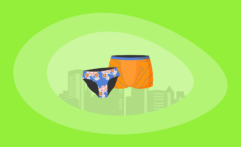10 Most Sustainable Organic Fabrics Clothing Brands: The Conscious Consumer’s Guide
Affiliate Disclosure
Hey fellow impactful ninja ?
You may have noticed that Impactful Ninja is all about providing helpful information to make a positive impact on the world and society. And that we love to link back to where we found all the information for each of our posts.
Most of these links are informational-based for you to check out their primary sources with one click.
But some of these links are so-called "affiliate links" to products that we recommend.
Why do we add these product links?
First and foremost, because we believe that they add value to you. For example, when we wrote a post about the environmental impact of long showers, we came across an EPA recommendation to use WaterSense showerheads. So we linked to where you can find them. Or, for many of our posts, we also link to our favorite books on that topic so that you can get a much more holistic overview than one single blog post could provide.
And when there is an affiliate program for these products, we sign up for it. For example, as Amazon Associates, we earn from qualifying purchases.
What do these affiliate links mean for you?
First, and most importantly, we still only recommend products that we believe add value for you.
When you buy something through one of our affiliate links, we may earn a small commission - but at no additional costs to you.
And when you buy something through a link that is not an affiliate link, we won’t receive any commission but we’ll still be happy to have helped you.
What do these affiliate links mean for us?
When we find products that we believe add value to you and the seller has an affiliate program, we sign up for it.
When you buy something through one of our affiliate links, we may earn a small commission (at no extra costs to you).
And at this point in time, all money is reinvested in sharing the most helpful content with you. This includes all operating costs for running this site and the content creation itself.
What does this mean for me personally?
You may have noticed by the way Impactful Ninja is operated that money is not the driving factor behind it. It is a passion project of mine and I love to share helpful information with you to make a positive impact on the world and society. However, it's a project in that I invest a lot of time and also quite some money.
Eventually, my dream is to one day turn this passion project into my full-time job and provide even more helpful information. But that's still a long time to go.
Stay impactful,
Amid growing concerns about the textile industry’s environmental impact, there is pressure to find greener clothes for your wardrobe. Organic fabrics are becoming quite the preferred textile materials as organic cultivation solves the widespread problems of pollution and exploitation in conventional farming. But are all organic fabrics green or somewhat greenwashed? So, we had to ask: Which are the most sustainable organic fabric clothing brands?
The most sustainable organic fabrics clothing brands are Eileen Fisher, Blue Canoe, and ARMEDANGELS, which use low-impact materials, employ full traceability, and strive for circularity. In addition, Toad&Co and Nudie Jeans commit to lowering carbon footprints and adhering to fair trade practices.
Whether you are searching for a sweater, a pair of yoga pants, or some comfortable underwear to add to your wardrobe without negatively impacting the soil, the water, the animals, and other people, there is a brand for you. So, let’s keep reading to learn more about the most sustainable organic fabrics clothing brands and how they ensure sustainable, ethical practices.
Here’s How Sustainable Organic Fabrics Generally Are
Fabrics can be labeled organic if made with at least 95% natural fibers created organically through growing plants or raising animals. Unlike synthetic or chemical-modified fibers, these plant-based or animal-derived fibers are renewable, biodegradable, and free of harmful synthetic chemicals and GMOs (genetically modified organisms), and, thus, are generally considered sustainable.
“Sustainable: The ability to be maintained at a certain rate or level | Avoidance of the depletion of natural resources in order to maintain an ecological balance”
Oxford Dictionary
To understand the sustainability of organic fabrics, we’ve assessed the life-cycle and each stage’s sustainability. This life-cycle assessment (LCA) is a method to evaluate the environmental impacts of products and materials. Here’s a quick summary of our LCA of organic fabrics!
What makes it so sustainable: Organic fabrics are made with natural fibers without any added toxic synthetic chemicals and, thus, are fully biodegradable at the end of their life.
Additionally: The breathable fabrics require less frequent washes, saving water and energy.
Here’s How We Selected the Most Sustainable Organic Fabrics Clothing Brands
The brands on this list were chosen based on their commitment and actions to promote sustainable practices while reducing the environmental impacts of the textile industry.
They are transparent about their materials, processes, and workforce management within their supply chain.
Some brands focus their efforts on reducing waste and optimizing natural resources while others strive to reduce the carbon footprint of their clothes.
All of these brands share the commitment to reshape the textile industry toward a more sustainable and Earth-friendly sector.
These Are the 10 Most Sustainable Organic Fabrics Clothing Brands
Most Sustainable Organic Fabrics Clothing Brands
Overall, these organic fabrics clothing brands are sustainable. Yet, they take various approaches to reduce environmental impacts and uphold ethical standards. Let’s dive into each brand and find out more.
Eileen Fisher: A Sustainable Fashion Brand Focusing on Eco-Friendly Materials and Textile Circularity
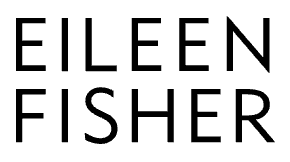
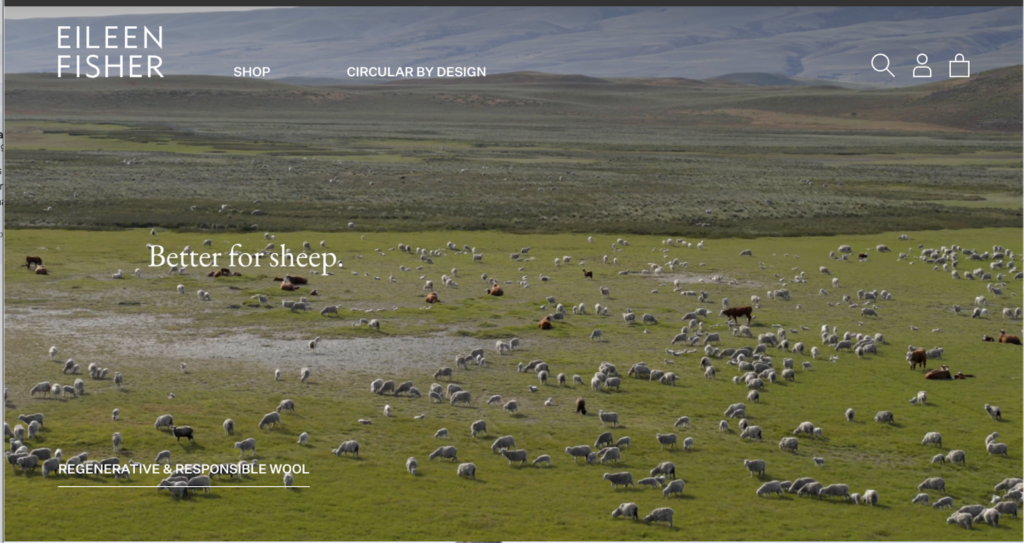
“The Biggest Thing We Can Do Is Reduce”
Eileen Fisher, founder of Eileen Fisher
🌎
How do they ensure their sustainability?
Eileen Fisher’s sustainability efforts focus on using eco-friendly materials, reducing greenhouse gas emissions generated from their operations and supply chain, reducing fabric and corporate waste, and recycling the brand’s used clothes back into new products. Specifically, they source organic fabrics, such as organic cotton and organic linen, to create a healthier environment for workers and wildlife. Their commitments to sustainable materials, circular systems, and environmentally friendly practices are demonstrated in initiatives like VISION 2020, Horizon 2030, and Renew. They are certified as a B Corporation and a Bluesign® brand.
🌐
How do they ensure their ethics?
Eileen Fisher is committed to ethical practices. They have worker empowerment initiatives such as collective bargaining and the right to make a complaint. For example, their “Our Love, Peru” project supports over 450 families in and around Arequipa with higher fair trade wages and investments in the local community. Additionally, Their VISION 2020, set in 2015, tackled unethical labor practices.
🤝
Are they part of any giving-back programs?
Eileen Fisher supports many women-owned businesses. The brand has provided, since their inception, many grants for women, including the current program Supporting Women in Environmental Justice.
🛍️
What is their product range?
- Best for: elegant, classic, and casual women’s clothes
- Product range: dresses, blouses, sweaters, cardigans, pants, skirts and outerwear, shoes, accessories
- Price range: $$$
- Size range: XXS–3XL
Blue Canoe: US-Manufactured Clothes Using Fabrics Derived From Organically-Farmed Plants

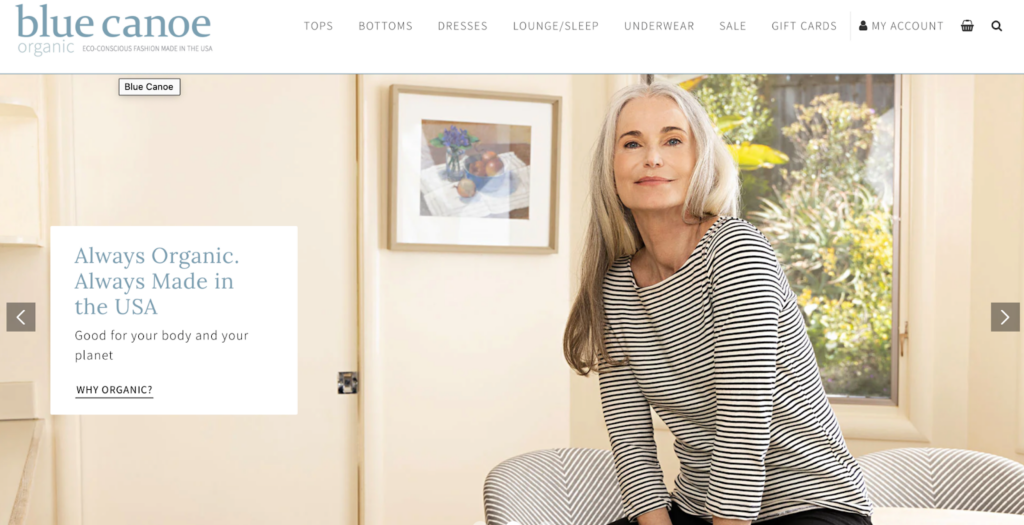
“We remain committed to using the finest fabrics, manufacturing from start to finish in the USA, and designing for the real world with simple lines, sensuous fabrics and sophisticated styles that are never fussy.”
Blue Canoe
🌎
How do they ensure their sustainability?
Blue Canoe ensures sustainability by sourcing exclusively organic fabrics made with plant fibers, predominantly organic cotton and organic bamboo, for their fabrics. They don’t use polyester or nylon, the polluting synthetic fabrics derived from nonrenewable resources. Further down the life-cycle in the manufacturing stage, Blue Canoe opts for using only US-based fabric mills that follow GOTS-certified standards in textile processing methods. Additionally, the fiber-reactive dyes they use for their garments require less water, create less waste, and are generally safer for people. Lastly, as they manufacture from start to finish locally in the US, they reduce their transporting carbon footprint.
🌐
How do they ensure their ethics?
Blue Canoe makes their clothes in the US, a medium-risk country for labor abuse. They maintain a simple supply chain to better control working conditions and product quality.
🤝
Are they part of any giving-back programs?
Blue Canoe is not known to be part of any giving-back programs.
🛍️
What is their product range?
- Best for: womenswear
- Product range: tops, bottoms, dresses, loungewear, sleepwear, underwear
- Price range: $$
- Size range: S–XL
ARMEDANGELS: Sustainable Clothing Brand Plus an Agent of Lifestyle Change

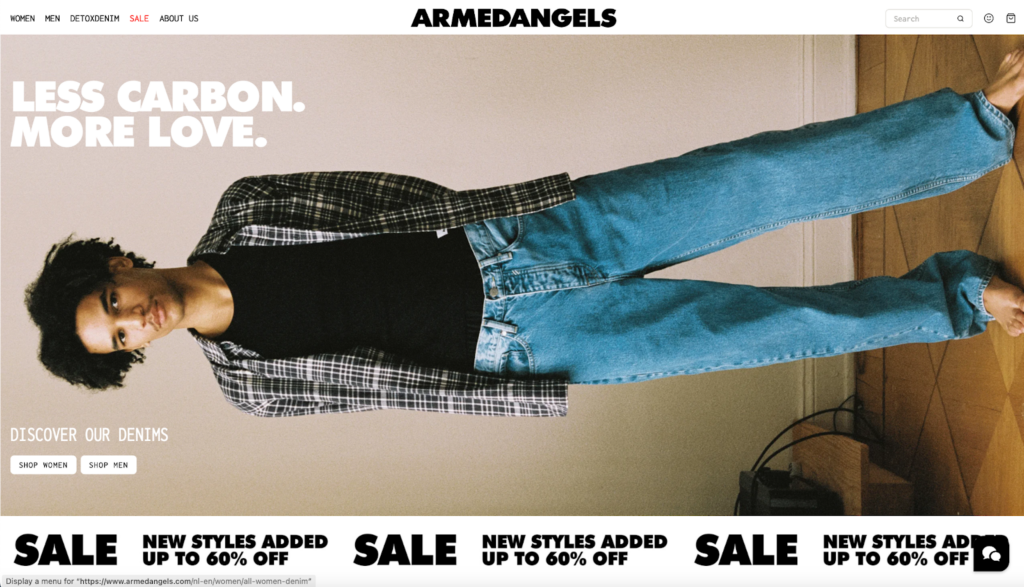
“So starting out with the humble tee, we took our oath against wage slavery, chemical shortcuts, and mass-producing pure crap, and transformed ourselves into one of the first clothing brands in all the land to put people and planet first.”
ARMEDANGELS
🌎
How do they ensure their sustainability?
ARMEDANGELS ensures sustainability by reducing carbon footprints while enabling people to change lifestyles to fight climate change. The brand innovates to cut down carbon emissions in their supply chain, starting with sourcing a high proportion of eco-friendly materials. Specifically, they source organic fabrics, including organic cotton certified by Global Organic Textile Standard (GOTS) and organic wool fabrics that meet not only GOTS but also the Responsible Wool Standard (RWS). Additionally, ARMEDANGELS chooses materials with the lowest carbon footprint possible, for example, opting for lyocell over silk, or natural fabrics over fossil-based synthetic fabrics, while increasing recycled content, such as recycled wool and recycled cotton. In other life-cycle stages, they lower the impact by eradicating unnecessary chemicals, bleaching without toxic chlorine, and using renewable energy. Their efforts to encourage lifestyle change include care and repair guides to keep garments longer in circulation. They also have a resale platform that facilitates traded-in to be sold again as second-hand clothes or recycled as fibers for new clothes.
🌐
How do they ensure their ethics?
ARMEDANGELS ensures their ethics by only working with trusted partners to deliver decent wages and workers’ safety. They directly and actively monitor all their suppliers and the suppliers’ nominated subcontractors via on-site and online Internal Due Diligence Check and Self-Assessment, external audits by Fair Wear Foundation (FWF), Global Organic Textile Standard and third-party audits, continuous support, and tailored training programs by third parties. ARMEDANGELS ensures payment of a living wage in part of their supply chain and pays a markup where they notice wage issues via the living wage project. Most importantly, they are fully transparent about the journey from raw material to their products, especially where people and animals are involved, and the impacts of their actions.
🤝
Are they part of any giving-back programs?
ARMEDANGELS raises funds by donating part of their sales to support various organizations and campaigns. For example, during the COVID-19 pandemic, they raised €745.800 ($790,883.61 USD) for Doctors Without Borders, facilitating isolation wards, COVID-19 clinics, and protective clothing for medical professionals worldwide. Other fundraising projects include supporting the climate movement with German Zero and the Climate Emergency Fund, fighting for equality with UN Women, advocating for fair payment and safe working conditions for Bangladeshi garment workers with the National Garment Workers Federation, and rescuing refugees in the Mediterranean Sea with Sea-Watch.
🛍️
What is their product range?
- Best for: kidswear, menswear
- Product range: jeans, jackets, jumpsuits, shorts, skirts, T-shirts
- Price range: $$
- Size range: XS–XXL
Toad&Co: Made-to-Order Clothes Using Highly Sustainable Materials
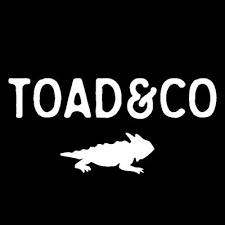
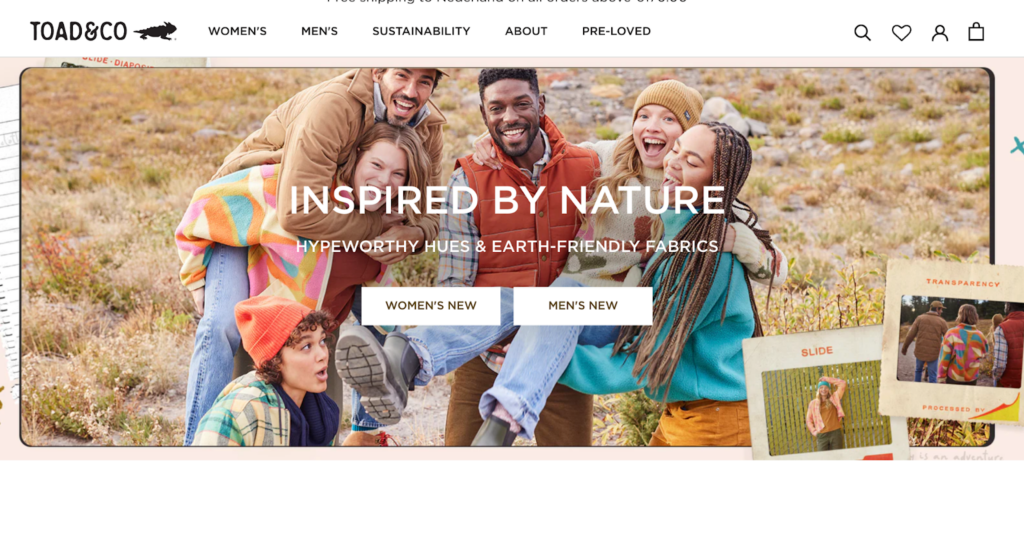
“Our commitment to a cleaner way of living and doing business has made us stronger and, like any good relationship, we take every day as it comes.”
Toad&Co
🌎
How do they ensure their sustainability?
Toad&Co promotes sustainability by sourcing eco-friendly materials, reducing carbon footprints, supporting textile circularity, and joining the responsible packaging movement. 100% of Toad&Co clothing is made with a minimum of 80% sustainable fibers and/or fabrics that have met Earth-friendly standards in accordance with Bluesign® or Standard 100 by OEKO-TEX®. They use organic fabrics (cotton), recycled fabrics, hemp, and TENCEL™. Furthermore, they purchase Renewable Energy Certificates (RECs) for all Toad&Co locations to offset their energy use by supporting the development of emission-free renewable energy and carbon reduction projects. The ToadAgain platform enables reselling and buying pre-loved items to reduce waste and extend the lifespan of clothing items. Additionally, Toad&Co provides resources for consumers to mend and extend the usage of their clothes.
🌐
How do they ensure their ethics?
Toad&Co is committed to promoting fair labor practices and safe working conditions in all factories in their supply chain. Their manufacturers are held to Toad&Co’s Workplace Code of Conduct to provide employees with a sustainable work environment. Their Code of Conduct follows the ILO Four Fundamental Freedoms principles. They also visit vendors’ facilities on a yearly basis to ensure that their clothes are produced with integrity. In 2010, Toad&Co was named one of Outside Magazine’s best places to work.
🤝
Are they part of any giving-back programs?
At the very beginning of their journey, Toad&Co co-founded Planet Access Company, which employs adults with disabilities, fostering inclusivity and diversity in the workforce. Additionally, they run programs that support people with disabilities to make arts and enjoy outdoor adventures. They also give 1% of all sales to environmental causes via 1% for the Planet membership. In the last 20 years, they have helped to fund 120 environmental protection organizations.
🛍️
What is their product range?
- Best for: menswear, womenswear
- Product range: shirts, sweaters, dresses, pants, maternity wear, T-shirts, shorts, underwear
- Price range: $$
- Size range: XS–XL
Nudie Jeans: Sustainable Denim Jeans Come With Free Repair for Life

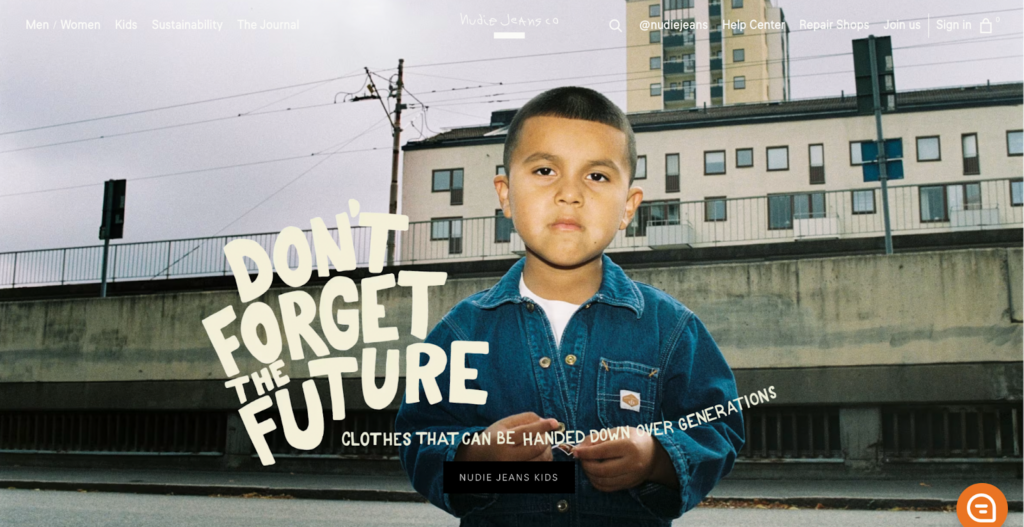
“When we started Nudie Jeans in 2001, we decided that environmental awareness and human rights would permeate everything we did.”
Maria Erixon, Co-Founder of Nudie Jeans
🌎
How do they ensure their sustainability?
Nudie Jeans promotes sustainability by sourcing a high proportion of low-impact materials, including organic cotton and recycled cotton. Of all fibers they used in 2022, 95,6% were organic, certified, or recycled fibers. 2022 was the sixth full year in which Nudie Jeans used exclusively certified organic fabrics in all their cotton products. Additionally, they ensure their sustainability by using renewable energy in their supply chain to reduce their carbon footprint. Lastly, Nudie Jeans strives to extend the life-cycle of denim jeans with initiatives to repair, reuse, and recycle. They offer free repair of Nudie Jeans no matter when or where they are bought at one of their Repair Shop or Repair Partner or by sending jeans owners a free DIY repair kit. In 2022, they repaired 65,386 jeans for free. Nudie Jeans also offers a 20% discount after you send in your pre-loved jeans to be washed, repaired, and resold in their Reuse range. In 2022, they sold 3,984 pairs of Reuse jeans. When repairing and reusing are not possible, they put the fabrics, reclaimed from used garments, production seconds, and leftovers, into recycling projects.
🌐
How do they ensure their ethics?
Nudie Jeans strives to be as transparent as possible about how their products are made. The full list of all their suppliers is available for download on their website. Most of these suppliers are certified by Fair Wear Foundation, Fairtrade International – Small Producers Organisations, Global Organic Textile Standard (GOTS), and Sedex Members Ethical Trade Audit – SMETA Best Practice Guidance, ensuring living wages and fair working conditions for workers making Nudie Jeans denim jeans.
🤝
Are they part of any giving-back programs?
Nudie Jeans has donated directly to various charity initiatives. For example, in 2022, they made monetary and jeans donations to UNICEF (to Ukrainian children and their families), Sustainably Crafted Clothing, Räddningsmissionen (The Rescue Mission), Thread Together, and Whitechapel School.
🛍️
What is their product range?
- Best for: menswear, womenswear
- Product range: shirts, hats, scarves, pants, coats, jackets, blazers
- Price range: $$$
- Size range: XS–XL
Tentree: A Lifestyle Clothing Brand That Plants Trees for Every Item Purchased

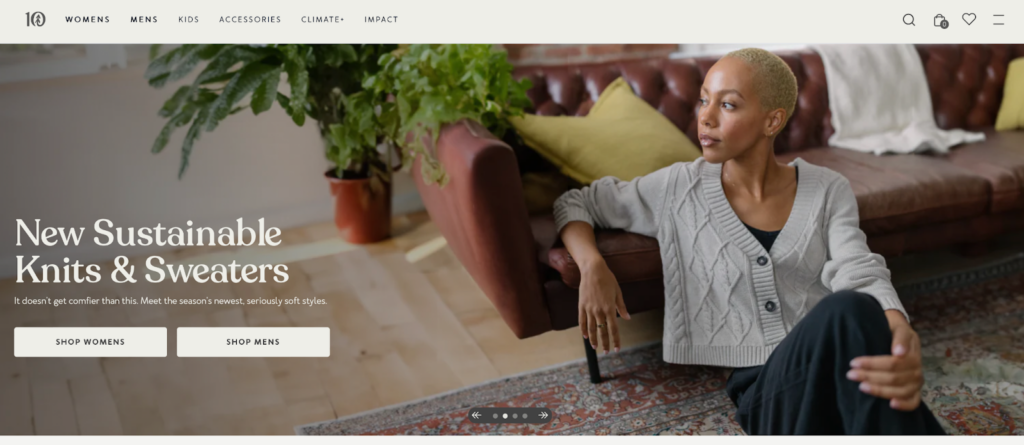
“We believe the future of business is restorative.”
Tentree
🌎
How do they ensure their sustainability?
Tentree ensures sustainability by planting trees, promoting circularity, opting for low-impact fabrics, and attaining responsible packaging. Since their inception, they have planted more than 100,000,000 trees, which helps regenerate ecosystems, capture carbon, and provide forestry jobs in communities around the world. Together with textile recycler SuperCircle and resale guru Treet, Tentree has created an integrated solution to resell or recycle pre-loved Tentree clothing items, keeping them in circulation and out of landfills. Tentree also uses eco-friendly fabrics and blends, including organic cotton, hemp, recycled polyester, and TENCEL™. Regarding packaging, they replaced all single-use plastics with FSC-certified and 100% recycled paper. Finally, they have B Corporation and Climate Neutral certifications.
🌐
How do they ensure their ethics?
Tentree enforces fair labor practices by collaborating only with manufacturers and suppliers that guarantee a safe and respectful environment for their employees. They regularly audit their partner facilities to ensure compliance with their Code of Conduct and international labor standards. Part of their supply chains is certified by organizations that protect workers, such as Fair Wear Foundation, Global Organic Textile Standard, Sedex Members Ethical Trade Audit, and Worldwide Responsible Accredited Production – WRAP. Additionally, Tentree commits to protecting forests through their paper, packaging, and fabric choices.
🤝
Are they part of any giving-back programs?
Giving back is a cornerstone of Tentree’s mission. Tentree plants 10 trees worldwide for every item purchased, contributing to reforestation and combating climate change. In 2022 alone, their customers helped plant over 22 million trees across nine countries, restoring over 2,000 hectares of terrestrial forests, over 1,000 hectares of coastal mangrove forests, and hundreds of hectares of marine land.
🛍️
What is their product range?
- Best for: kidswear, menswear, womenswear
- Product range: T-shirts, tank tops, shirts, sweaters, cardigans, dresses, pants, hoodies, dresses, shorts, skirts, joggers, jackets, coats, underwear
- Price range: $$
- Size range: XXS–XXL
Organic Basics: A Carbon Neutral Brand Creating Underwear, Activewear, and Everyday Essentials


“We make our basics to be both Earth- and people-friendly — carefully choosing materials and fabrics that care for our environment, only partnering with factories that consider their impact too, and designing all the basics for all bodies.”
Organic Basics
🌎
How do they ensure their sustainability?
Organic Basics promotes sustainability by choosing fabrics based on their environmental footprint and lifetime durability. Their clothes are made organic fabrics (cotton certified by the Global Organic Textile Standard), low-impact textiles (TENCEL™ lyocell certified by the STANDARD 100 by OEKO-TEX®), or recycled materials (recycled wool, recycled cotton, and recycled nylon). They use a small percentage of elastane (spandex) in some garments to extend the products’ longevity, which ultimately extends the lifespan. Organic Basics is fully transparent about the impact of their products, enabling consumers to understand their share in using the clothes. Organic Basics partners with Made2Flow, which calculates their emissions, and One Carbon World, which helps them reduce and offset all their emissions. Finally, they are also a B Corporation.
🌐
How do they ensure their ethics?
Organic Basics works only with trusted, certified factory partners, who ensure that their workplace is free of child labor and forced labor and that their workers enjoy a safe working space, earn a living wage, and benefit from employee perks like free lunches and childcare. They show full transparency of the location and practices in their factories. Organic Basics also audits or visits most of their suppliers.
🤝
Are they part of any giving-back programs?
Organic Basics donates 1% of the value of all orders to sustainable projects. Their partnership with Beam Impact enables consumers to choose where their 1% donation will go, at no extra cost to the consumers, to support local charities that help Nature Conservation, Ocean Conservation, Rewilding, or Sustainability & Gender Equity.
🛍️
What is their product range?
- Best for: womenswear, menswear
- Product range: underwear, bras, bottoms, T-shirts, tops, sweatshirts, hoodies, knitwear dresses, swimwear, socks, plus-size
- Price range: $$$
- Size range: XXS–XXL
Pact: Stylish, Comfortable, Essential Clothing Made Ethically and Sustainably


“We believe the planet, and the people on it, should always come first in fashion.”
Pact
🌎
How do they ensure their sustainability?
Pact ensures sustainability by using low-impact textile and packaging materials, offsetting the carbon impact of all their products, and facilitating the donation of used clothes to reduce waste. They use a high proportion of eco-friendly fabrics, including organic fabrics made with GOTS-certified cotton. Additionally, their clothes are delivered in the VelaTM paper bags. These bags are made with carbon-neutral, FSC-certified, recyclable paper. Pact also partners up with SimpliZero. This partnership enables measuring the impact of every product Pact makes and offsetting it through reforestation, renewable energy, and community projects sequestering carbon from the atmosphere. Their Give Back Box incentive enables their customers to reuse the boxes their pact orders came in and donate their used clothes to local charities with the postal fee paid for by Pact.
🌐
How do they ensure their ethics?
Pact uses Fair Trade CertifiedTM factories, providing safe working conditions, community support, and additional development funds to workers in their supply chain. They trace most of their supply chain, including the final stage of production.
🤝
Are they part of any giving-back programs?
Pact is not known to be part of any giving-back programs.
🛍️
What is their product range?
- Best for: womenswear, menswear
- Product range: dresses, hoodies, sweatshirts, activewear, sleepwear, maternity wear, T-shirts, underwear, jumpsuits, playsuits, plus-size
- Price range: $$$
- Size range: XS–XXXL
Beaumont Organic: Create “Contemporary Conscious Clothing” Responsibly

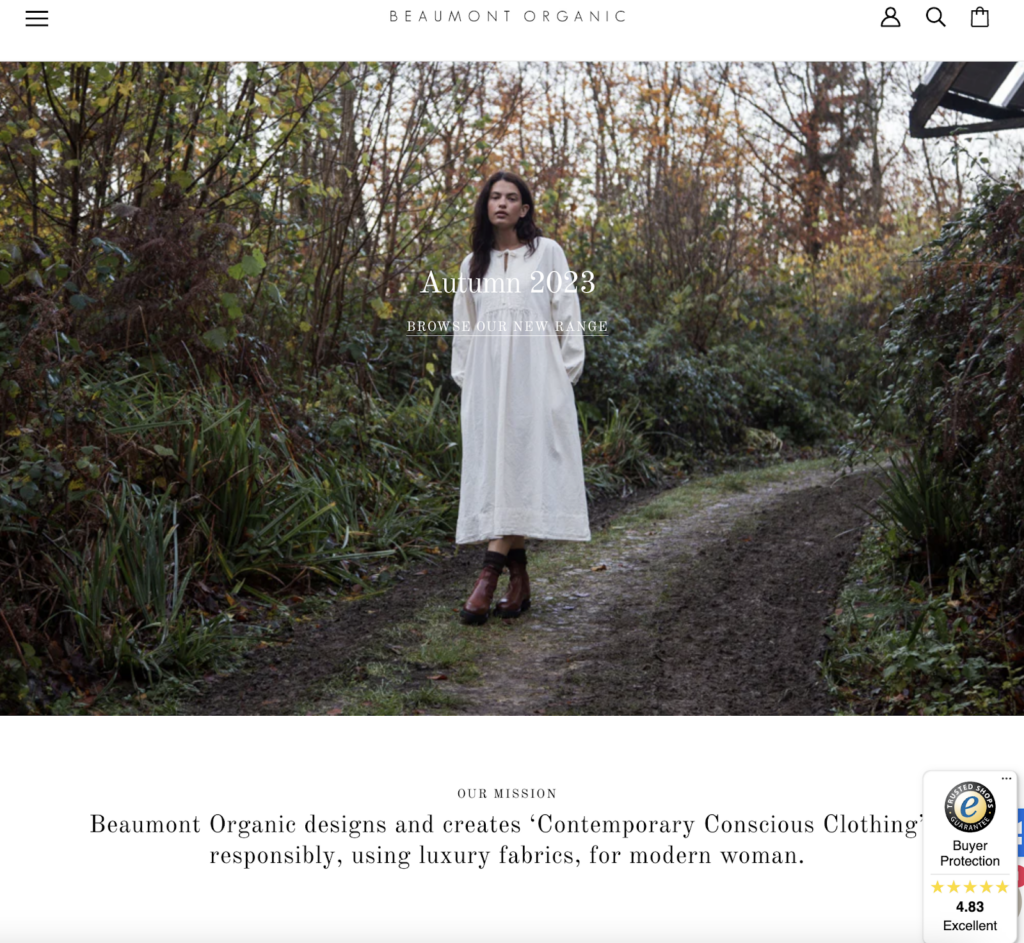
“We work hard behind the scene to provide you with full transparency into the sustainability of our practices and our suppliers”
Beaumont Organic
🌎
How do they ensure their sustainability?
Beaumont Organic prioritizes sustainability by sourcing low-impact materials, using renewable energy in their supply chain, and reducing waste by using recycled packaging and offering clothes repairs. Additionally, they promote textile circularity with their online circular resale scheme, allowing customers to pass their pre-loved garments onto a new home. The brand features organic fabrics (organic linen and organic cotton certified by the Global Organic Textile Standard). They also use recycled fabrics, lowering their impact while reducing textile waste.
🌐
How do they ensure their ethics?
Beaumont Organic is fully transparent about the final stage of their clothes: European factories that pay fair wages and have good working conditions. Beaumont Organic uses wool accredited by the Responsible Wool Standard, guaranteeing the welfare of the animals in their supply chain.
🤝
Are they part of any giving-back programs?
The Beaumont Organic Foundation has supported various community give-back projects in Fiji, including hospital renovations.
🛍️
What is their product range?
- Best for: womenswear, babywear, homeware, accessories
- Product range: shirts, pants, jackets, blazers, knitwear, blouses, underwear
- Price range: $$$
- Size range: XS–XXL
VAUDE: Outdoor Gear and Apparel Where Performance Meets Ecology

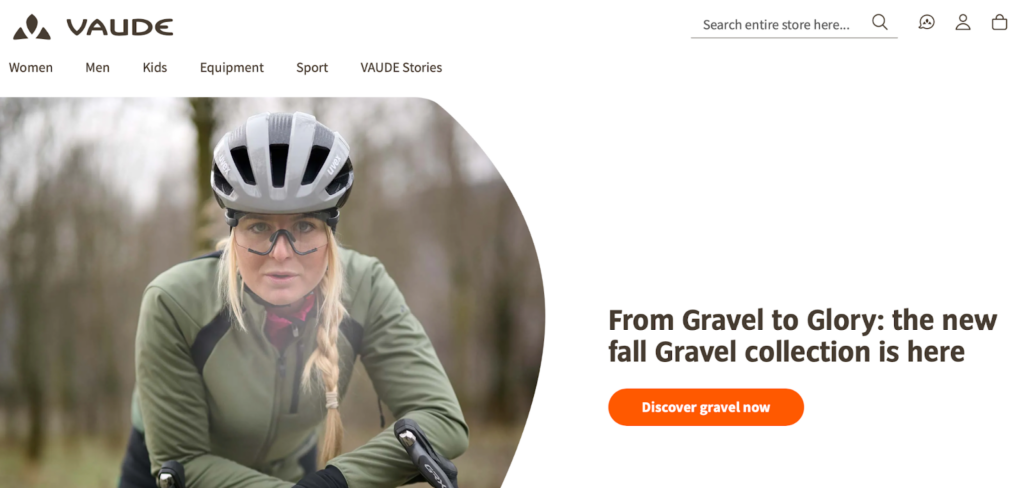
“We design with a focus on minimal material consumption, try to avoid waste and design products that are timeless, durable and repairable.”
VAUDE
🌎
How do they ensure their sustainability?
VAUDE prioritizes sustainability by creating a counterbalance to resource-consuming lifestyles. They achieve that by making durable and versatile products for life, minimizing waste during manufacturing, and enabling longer product lifespan with maintaining, repairing, donating, and upcycling guidance. VAUDE opts for materials that combine technical performance and ecological responsibility. For example, they use sheep wool, which makes a warm and water-repellent protective layer ideal for mountain sporting, while lowering the impact of this fabric by adhering to the Responsible Wool Standard and the Global Organic Textile Standard for virgin organic wool and increasing the content of GRS-certified recycled wool in their collection. VAUDE commits to having 50% recycled or biobased material content in 90% of their products by 2024. Furthermore, their products have been certified by Bluesign® and Green Button. Regarding their impact, the brand sets science-based climate goals to reduce global emissions as quickly as possible, aligning with the Paris Agreement’s 1.5 degrees in global warming, and is on track with their target as of October 2022, according to Science Based Targets (SBTi). They achieved that by measuring the total carbon footprint and implementing reduction measures in hotspots like material, energy, and transport. Since the beginning of 2022, VAUDE has been a carbon-neutral company, achieved through fully offsetting their global greenhouse gas emissions in the My Climate’s climate change mitigation project in Vietnam, their most important country of production.
🌐
How do they ensure their ethics?
VAUDE ensures ethical practices for both humans and animals involved in their operation. They work with the Fair Wear Foundation to monitor their final stage of production, ensuring safe working conditions and fair wages for factory workers. They also audit 100% of their producers in high-risk countries. Additionally, VAUDE has a basic policy to support diversity and inclusion in their direct operations and supply chain. Regarding animal rights, they follow the Responsible Wool Standard, appropriately addressing sheep’s welfare and the land they graze on.
🤝
Are they part of any giving-back programs?
VAUDE donates FairWertung the products that can’t be repaired but are still perfectly functional. In 2021, VAUDE donated products with a merchandise value of approximately €339,000 (approximately $375,000 USD) to the network, which makes clothes affordable via charity shops or second-hand stores.
🛍️
What is their product range?
- Best for: sportswear (cycling, hiking, skiing) and urban outdoor clothes for women, men, kids
- Product range: jackets, hoodies, sweaters, shirts, vests, pants, shorts, skirts, functional underwear
- Price range: $$$
- Size range: XS–XXXL
Organic Fabrics Clothing: Breathable Natural Materials Cultivated From Organic Farms
Organic fabrics are made with natural fibers cultivated without toxic synthetic chemicals. In contrast, conventional natural fibers, especially cotton and sheep wool, are notorious for polluting production, both during farming and manufacturing.
Here are the life-cycle stages of organic fabrics and each stage’s sustainability assessment:
- Sourcing of organically-cultivated fibers: Sourcing plant-based or animal-derived fibers from organic farming systems is generally sustainable. These systems avoid the most harmful synthetic agrochemicals and their adverse environmental impacts. However, due to relatively low fiber yields, organic farms cultivating fiber crops (such as cotton) or raising hair-providing animals (such as sheep) can be resource-intensive.
- Manufacturing of organic fabrics clothing: Manufacturing organic fabrics varies depending on the organic fibers used. Manufacturing clothes made with organic plant-based fabrics, such as cotton, hemp, and linen, is generally sustainable because it can be done mechanically without adding toxic chemicals. In comparison, manufacturing organic wool and silk—animal-derived textile materials—can be less sustainable because the processes are more energy and water-intensive.
- Transportation of organic fabrics clothing: Transporting organic fabrics is generally unsustainable. It can be a carbon-intensive life-cycle stage for clothing and household items made with organic fibers due to the distances covered and emissions associated with transporting vehicles. Organic fabrics typically travel from fields (where plants or animals are farmed) to factories, then sorting centers, shops, and consumers’ homes before going to recycling centers or landfills.
- Usage of organic fabrics clothing: Using organic fabrics is generally sustainable. Organic fabrics are made with natural fibers with high breathability, especially compared with synthetic fabrics. They don’t need to be washed frequently, thus saving water and energy. Most commonly used organic fibers are strong, meaning materials made with those fibers can last long before a replacement is needed. Lastly, washing organic fabrics doesn’t cause microplastics to be released into the environment.
- End-of-life of organic fabrics: The end-of-life stage for organic fabrics is generally sustainable. Organic fabrics are made with organic natural fibers, resulting in the material being biodegradable and compostable.
The sustainability of organic fabrics varies, depending on the fibers used. The negative environmental impacts—especially on water and land categories—of growing certain crops or raising certain animals, and processing certain fibers can be so significant that they reduce the sustainability of fabrics made with such organic fibers. However, organic fabrics are breathable and biodegradable, which are two tell-tale signs of textile sustainability.
Why Is It Important to Buy Products Made of More Sustainable Fabrics
It is important to buy products made of more sustainable fabrics because a sustainable textile industry has a lower carbon footprint, helps save natural resources, and is ultimately better for forests, animals, and humans.
Buying Sustainable Fabrics Reduces Your Carbon Footprint
The production of clothing and footwear is estimated to contribute 10% of global greenhouse gas emissions—more than all international flights and shipping combined. If the fashion industry were a country, it would be the fourth largest emitter of carbon dioxide.
One way to reduce the carbon footprint of the clothes you buy is to opt for sustainable fabrics. Sustainable fabrics, which are often made with natural or recycled fibers, have relatively low carbon footprints compared to petroleum-based fabrics. For example, organic fabrics made in the US have a carbon footprint of 2.35 kg CO2 (per ton of spun fiber)—a quarter of polyester’s carbon footprint.
Buying Sustainable Fabrics Reduces Demand for Natural Resources and Waste Management
The textile industry uses water and land to grow cotton and other fibers. It is estimated that 79 billion cubic meters of water were used for the sector worldwide in 2015. For example, producing a single cotton T-shirt requires as much water as one person drinks for 2.5 years (2,700 liters of fresh water).
Worse yet, the textile economy is vastly more linear than circular: the largest amount of resources used in clothes ended up in landfills (instead of being recycled to remake clothes). According to a report by the Ellen MacArthur Foundation,
- Less than 3% of materials used in the textile economy in 2015 came from recycled sources.
- In other words, more than 97% of resources used in making clothes are newly extracted.
When clothing items are disposed of within a short period of time—under a year in the case of half of the fast fashion clothes—the natural systems that provide raw materials for fabrics don’t have enough time to recover and regenerate, which could lead to ecological breakdown.
Sustainable fabrics are made with less water and emissions while lasting longer:
- Because they are durable, you don’t need to buy new clothes too often.
- Thus, you help reduce the pressure to extract more resources for making new items.
Similarly, making and consuming sustainable fabrics made with recycled materials reduces the demand for virgin materials while helping tackle waste management.
Buying Sustainable Fabrics Encourages Sustainable Management of Forests
Sustainable plant-based fabrics are made with raw materials from forests and plantations that are sustainably managed, such as by complying with FSC standards.
When you buy sustainable plant-based fabrics, you discourage unsustainable forestry practices like illegal logging. By doing this, you can also help reduce deforestation, biodiversity loss, and the effects of climate change.
Buying Sustainable Fabrics Encourages Fairer Treatment of Animals
The fashion industry is rife with animal mistreatment when it comes to making animal-based fabrics like wool or silk. Every year, billions of animals suffer and die for clothing and accessories.
Buying sustainable vegan alternatives can help to reduce the pressure on raising more and more animals to meet the demand for animal-based fabrics while sacrificing their well-being and lives.
Suppose you have to buy fabrics made with, for example, wool or silk. In this case, make sure you only choose brands committed to cruelty-free products. In doing so, you help advocate better treatments for animals raised within the textile industry.
Using Sustainable Fabrics Encourages Fairer Treatment of Textile Workers
Recent statistics from UNICEF estimated as many as 170 million child laborers worldwide, many of whom were engaged in some form of work in the textile industry. They don’t get paid minimum wages and often work long hours.
When you buy sustainable fabrics from brands transparent about the working conditions at their factories, you discourage the use of child labor and help promote better working conditions for textile workers.
How Can You Generally Buy More Sustainable Fabrics
The key to sustainably buying fabrics is to check on relevant environmental and original certifications.
For natural fabrics:
- Global Organic Textile Standard (GOTS): A globally recognized certification system that ensures a certain threshold of organic content has been met. It covers manufacturing, packaging, labeling, transportation, and distribution (but not what happens in the fields where crops are grown).
- USDA Certified Biobased Product: The USDA BioPreferred® Certification is a voluntary certification offered by the United States Department of Agriculture. The certification identifies products made from plants or other renewable materials.
- Ecolabel: Ecolabel is the official European Union voluntary label recognized worldwide for certified products with a guaranteed, independently verified low environmental impact. The label requires high environmental standards throughout the entire life-cycle: from raw material extraction through production and distribution to disposal. It also encourages companies to develop innovative, durable, easy-to-repair, and recyclable products.
For plant-based semi-natural/semi-synthetic fabrics:
- Forest Stewardship Council: An FSC certification ensures that the wood (or wood-like material) comes from responsibly managed forests that provide environmental, social, and economic benefits.
There are two types of FSC Certification:- FSC Forest Management Certification, with a focus on the origin of the wood—the forest.
- FSC Chain of Custody Certification, which focuses on the path from the forest to the customer’s home.
- Program for Endorsement of Forest Certification: PEFC’s approaches to sustainable forest management are in line with protecting the forests globally and locally and making the certificate work for everyone. Getting a PEFC certification is strict enough to ensure the sustainable management of a forest is socially just, ecologically sound, and economically viable but attainable not only by big but also small forest owners.
For recycled fabrics:
- Recycled Claim Standard (RCS): The Textile Exchange RCS was originally developed as an international, voluntary standard that sets requirements for third-party certification of Recycled input and chain of custody.
- The Global Recycled Standard (GRS): The Global Recycled Standard (GRS) is an international, voluntary, full product standard that sets requirements for third-party certification of Recycled Content, chain of custody, social and environmental practices, and chemical restrictions. It can be used for any product with more than 20% recycled material.
For all types of fabrics:
- STeP by OEKO-TEX®: STeP by OEKO-TEX® is an independent certification system for brands, retailers, and manufacturers from the textile and leather industry. It communicates organizational environmental measures, including reducing carbon footprint and water usage.
- OEKO-TEX® Standard 100: OEKO-TEX® labels aim to ensure that products pose no risk to human health (i.e. containing banned chemicals).
Some certifications that are signaling brands’ efforts toward lowered environmental impacts and a circular economy are:
- B Corp Certification: The label B Corp is a certification reserved for for-profit companies. Certified holders are assessed on their social and environmental impacts.
- Cradle2Cradle certification: Cradle2Cradle provides a standardized approach to material circularity. It assesses whether products have been suitably designed and made with the circular economy in mind covering five critical categories: material health, material reuse, renewable energy and carbon management, water stewardship, and social fairness.
Final Thoughts
Organic fabrics, especially plant-based varieties, are generally highly sustainable. Neither sourcing nor producing organic fibers uses harmful synthetic chemicals, avoiding the adverse environmental impacts of such substances. However, land and water use can be significant for some organic fibers, such as organic cotton and wool. Organic fabrics are generally breathable, leading to a low-impact usage phase. At the end of their life, they are readily biodegradable and suitable for composting.
By purchasing new or pre-loved organic fabrics from brands that commit to sustainability, you support their mission to create a fairer and less harmful textile industry for all lives on Earth.
Here is the list (again) of the most sustainable organic fabrics clothing brands:
- Eileen Fisher
- Blue Canoe
- ARMEDANGELS
- Toad&Co
- Nudie Jeans
- Tentree
- Organic Basics
- Pact
- Beaumont Organic
- VAUDE
To make your use of these fabrics even more sustainable, follow these steps:
- Buy second-hand, recycled, or upcycled clothes made with organic fabrics.
- While using organic fabrics clothing, maximize the number of wears between washes and keep it as long as possible.
- At the end-of-life of your organic fabrics clothing, upcycle the materials to extend their usage and arrange for them to be recycled or properly disposed of.
Stay impactful,

Sources
- Global Organic Textile Standards (GOTS): GOTS Version 6.0
- Science Direct: Life-cycle assessment (LCA)
- Impactful Ninja: How Sustainable Are Organic Fabrics? A Life-Cycle Analysis
- Eileen Fisher: Home
- Blue Canoe: Home
- ARMEDANGELS: Home
- Toad&Co: Home
- Nudie Jeans: Home
- Tentree: Home
- Organic Basics: Home
- Pact: Home
- Beaumont Organic: Home
- VAUDE: Home
- Impactful Ninja: How Sustainable Are Organic Cotton Fabrics? A Life-Cycle Analysis
- Impactful Ninja: How Sustainable Are Organic Linen Fabrics? A Life-Cycle Analysis
- Eileen Fisher: Cotton
- Eileen Fisher: OUR VISION2020 RESULTS
- Eileen Fisher: Our Brand
- B Corporation: Eileen Fisher
- Bluesign: Home
- Good On You: Brand Directory | Eileen Fisher
- Eileen Fisher: Community | Love, Peru. Our Fair Trade Project.
- CFDA: HOW EILEEN FISHER IS THE ULTIMATE SUSTAINABLE LABEL
- Seek Capital: 11 Small Business Grants For Women
- Blue Canoe: The Story Behind Blue Canoe
- Blue Canoe: Bamboo Collection
- Impactful Ninja: How Sustainable Are Polyester Fabrics? A Life-Cycle Analysis
- Impactful Ninja: How Sustainable Are Nylon Fabrics? A Life-Cycle Analysis
- Impactful Ninja: How Sustainable Are Synthetic Fabrics? A Life-Cycle Analysis
- Blue Canoe: COLLECTION
- Good On You: Brand Directory | ARMEDANGELS
- Global Organic Textile Standard (GOTS): Home
- Impactful Ninja: How Sustainable Are Organic Wool Fabrics? A Life-Cycle Analysis
- ARMEDANGELS: THE JOURNEY FROM RAW MATERIAL TO PRODUCT | Organic Wool
- ARMEDANGELS: About Us
- Impactful Ninja: How Sustainable Are Lyocell Fabrics? A Life-Cycle Analysis
- Impactful Ninja: How Sustainable Are Silk Fabrics? A Life-Cycle Analysis
- Impactful Ninja: How Sustainable Are Natural Fabrics? A Life-Cycle Analysis
- ARMEDANGELS: RETURN YOUR OLD CLOTHES | RECYCLING WITH BENEFITS
- Impactful Ninja: How Sustainable Are Recycled Wool Fabrics? A Life-Cycle Analysis
- Impactful Ninja: How Sustainable Are Recycled Cotton Fabrics? A Life-Cycle Analysis
- ARMEDANGELS: DETOX DENIM
- ARMEDANGELS: Care Guide
- ARMEDANGELS: Repair Guide
- ARMEDANGELS: ACTION REPORT 2021
- Fair Wear Foundation: Home
- ARMEDANGELS: LIVING WAGE PROJECT
- ARMEDANGELS: Collaborations
- Doctors Without Borders: Home
- German Zero: Home
- Climate Emergency Fund: Home
- Sea Watch: Home
- TOAD&CO: A TOAD IS BORN
- TOAD&CO: SUSTAINABILITY
- TOAD&CO: THE CIRCULAR ECONOMY
- TOAD&CO: OUR PACKAGING JOURNEY
- FIBRE2FASHION: Interview With Gordon Seabury
- OEKO-TEX: Standard 100 by OEKO-TEX®
- Impactful Ninja: How Sustainable Are Recycled Fabrics A Life-Cycle Analysis
- Impactful Ninja: How Sustainable Are Hemp Fabrics A Life-Cycle Analysis
- Impactful Ninja: How Sustainable Are TENCEL Fabrics? A Life-Cycle Analysis
- THE INTERNATIONAL REC STANDARDS: HOME
- TOAD&CO: OUR HISTORY
- TOAD&CO: ToadAgain Platform
- TOAD&CO: WORKPLACE CODE OF CONDUCT
- TOAD&CO: GOOD BUSINESS
- Planet Access Company: Home
- TOAD&CO: EVERYONE DESERVES OPPORTUNITIES
- SEARCH INC: SEARCH FOR ADVENTURE
- TOAD&CO: GOOD PRODUCTS ARE NOTHING WITHOUT GOOD INTENTIONS
- One Percent For The Planet: Home
- Good On You: Brand Directory | Nudie Jeans
- Nudie Jeans: Nudie Jeans Sustainability Report 2022
- Nudie Jeans: Sustainability | 100% Organic Cotton
- Nudie Jeans: Sustainable Product | Repair
- Nudie Jeans: Sustainable Product | Reuse
- Nudie Jeans: Sustainable Product | Recycle
- Nudie Jeans: Re-use — Drop 17
- Nudie Jeans: We might just be the most transparent denim company in the world…
- Nudie Jeans: List of Suppliers
- Fair Wear Foundation: Home
- Fair Trade International: Small-scale Producer Organizations
- Thread Together: Home
- Tentree: Tree Planting FAQ
- Tentree: Circularity By tentree
- Tentree: Our Materials
- Tentree: Thinking Outside the Box
- Tentree: WE’RE TENTRE | We Believe Big Change Starts Small.
- SuperCircle: Home
- Treet: Home
- Tentree: SuperCircle
- B Corporation: Tentree
- CLIMATE NEUTRAL: Tentree
- Tentree: Ethical Manufacturing
- Good On You: Brand Directory | Tentree
- Fair Wear Foundation: Home
- Global Organic Textile Standard: Home
- Sedex Members Ethical Trade Audit: Home
- Worldwide Responsible Accredited Production – WRAP: Home
- Shopify: Ten Tree International Inc. (tentree) | Commitment to Protect Forests Through Our Paper, Packaging and Fabrics Choices
- Tentree: THE ENVIRONMENTOR | Here’s Where We Plant Your Trees
- Tentree: 04 nature | TENTREE SUSTAINABILITY
- Organic Basics: FAQ
- Impactful Ninja: How Sustainable Are Recycled Nylon Fabrics? A Life-Cycle Analysis
- Impactful Ninja: How Sustainable Are Elastane Fabrics? A Life-Cycle Analysis
- Impactful Ninja: How Sustainable Are Spandex Fabrics? A Life-Cycle Analysis
- Made2Flow: Home
- One Carbon World: Home
- B Corporation: Organic Basics
- Organic Basics: Factories
- Good On You: Brand Directory | Organic Basics
- Organic Basics: Our Impact
- Beam Impact: Home
- Good On You: Brand Directory | Pact
- Impactful Ninja: How Sustainable Are Cotton Fabrics? A Life-Cycle Analysis
- VelaTM paper bags: Home
- Pact: Responsible Packaging
- SimpliZero: Home
- Pact: Sustainability, Certified
- Pact: Give Back Box
- Good On You: Brand Directory | Beaumont Organic
- Beaumont Organic: Shipping & Delivery
- Beaumont Organic: Repair Scheme
- Beaumont Organic: Resale Scheme
- Beaumont Organic: Our Sustainable Story
- Beaumont Organic: The Beaumont Organic Foundation
- VAUDE: CSR Report | Produce Philosophy
- Good On You: Brand Directory | VAUDE
- VAUDE: CSR Report | Don’t wash any more than necessary
- VAUDE: CSR Report | Repair Don’t Replace
- VAUDE: CSR Report | Second-hand and donations
- VAUDE: CSR Report | Upcycling
- VAUDE: CSR Report | Material Policy
- VAUDE: CSR Report | Wool
- Green Button: Home
- Science Based Targets (SBTi): Home
- VAUDE: CSR Report | Climate Footprint
- VAUDE: CSR Report | Climate-Neutral Business
- VAUDE: CSR Report | Our Producers
- FairWertung: Home
- Impactful Ninja: How Sustainable Are Sheep Wool Fabrics? A Life-Cycle Analysis
- European Parliament: The impact of textile production and waste on the environment (infographic)
- Science Direct: The challenge of “Depeche Mode” in the fashion industry – Does the industry have the capacity to become sustainable through circular economic principles, a scoping review
- Science Direct: Carbon Footprint of Textile and Clothing Products
- European Parliament: Environmental impact of the textile and clothing industry
- European Parliament: What if fashion were good for the planet?
- Ellen MacArthur Foundation: A New Textiles Economy: Redesigning fashion’s future
- McKinsey: Style that’s sustainable: A new fast-fashion formula
- Forest Stewardship Council: Home
- Our World in Data: Deforestation and Forest Loss
- Our World in Data: Renewable Energy
- Peta: Animals Used For Clothing
- The Guardian: Child labour in the fashion supply chain
- BioPreferred: WHAT IS THE BIOPREFERRED PROGRAM?
- European Commission: Environment | EU Ecolabel
- Forest Stewardship Council
- FSC Forest Management Certification
- FSC Chain of Custody Certification
- Program for Endorsement of Forest Certification
- Textile Exchange: The RCS and GRS are designed to boost the use of recycled materials
- OEKO-TEX: Certification according to STeP by OEKO-TEX®
- B Corp Certification: Home
- C2CCertified: Home

